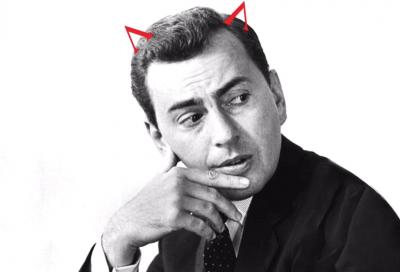Books: Setting Gore Vidal's record straight

ROME - Gore Vidal was one of those writers whose public persona grew larger than both his literary reputation and his literary gifts.
We all knew him – even we Brits – even if we’d never read any of the books that were bestsellers way back in the 60s and 70s. He was the guy who appeared on TV chat shows looking unbelievably handsome and patrician while expounding exactly those views about his native land that we felt but never quite had the nerve or the opportunity to express – that it was an imperialist power run by a cabal of crooked, unshackled capitalists, that kind of thing. He was also the guy who’d dish out the gossip about everybody he had known, from Jacqueline Bouvier all the way to, er, Jackie Onassis. He was also, even in those now-distant times when such an admission meant social death, openly homosexual. In all, a man who came from the privileged class of American society yet undermined it with both his lifestyle and his caustic, leftish criticism; a WASP in more ways than one.
Given his views, it is perhaps not surprising that for much of his life he abandoned America for weary and permissive old Europe, in particular for Italy, which he had first visited in 1948 with Tennessee Williams. So it is in Rome that this book starts, because Michael Mewshaw – self-confessed mid-list writer to Vidal’s bestseller status – had just joined the shifting and largely American expatriate society that existed in the city in those days. The year was 1975 and a visit to the great man’s apartment overlooking Largo Argentina led to a friendship that lasted almost forty years.
This book, Mewshaw explains, is an attempt to set the record about Vidal straight, to show the person who, “like the city [Rome] concealed his deepest secrets behind an elaborate façade”. Out of this emerges a revealing and at times brilliant portrait of the man who, contrary to his popular image, comes across as “generous, hospitable, loyal to friends”, the first two qualities being demonstrated when, apparently without a moment’s thought, he lent the Mewshaw family his famously palatial Villa La Rondinaia on the Amalfi coast so that Michael would have space to work on his current book.
As Mewshaw observes, difficult to imagine Somerset Maugham lending Villa La Mauresque in Cap Ferrat to an impecunious colleague. Difficult too, to imagine Maugham being quite so open about his sexuality to another writer who was quizzing him about what attracted him to Rome so much. “What I like,” Mewshaw quotes him as saying, “is that when I came here shortly after World War II you could go up to the Pincio at night and buy any boy you wanted for five hundred lire.” With Vidal the unexpected clearly became the norm.
Mewshaw conveys the flavour of those now distant days with an expert touch. It’s not Paris in the twenties but it’s the next best thing, with Gore holding court in the local trattoria and the Red Brigades studiously ignored. The master’s conversation might on occasion lack a certain delicacy – it must have been tedious to listen to apparently interminable talk about the genitals of famous men – but there is wit and laughter aplenty to go with the famous Vidal spleen.
However, the abiding impression that comes from this evocative portrait is that Gore Vidal was a profoundly lonely man. Lonely but not alone. There’s a buzz of people around him. Susan Sarrandon, Italo Calvino, Walter Matthau, Eliot Gould, Mickey Knox, the names flit in and out of the narrative and yet despite all these friends and acquaintances and despite the continuing presence of Vidal’s lifelong and long-suffering partner, Howard Austen, you feel that there was something hollow at the centre. Vidal always derided the idea of love. Maybe that was the problem.
The last part of the book is taken up by his decline. It was a sorry one. Mewshaw doesn’t pull his punches but as we read of too much booze and too many drunken pratfalls, such is the honesty of the whole portrait that the reader actually feels sympathy for Vidal. How he would have hated that! By the end Sympathy for the Devil becomes a kind of tragedy, but a tragedy of our times rather than the heroic times of which Vidal wrote in much of his historical fiction.
Gore Vidal goes out not with a bang but a whimper. “Help me, Mike,” are his last recorded words to the author, “I don’t know what I’m supposed to feel.” The occasion was after a talk he had given at the 2009 Key West Literary Seminar, when he was being lionised by the audience. But it might have stood for his whole life.
Sympathy for the Devil, Four decades of friendship with Gore Vidal. By Michael Mewshaw. Farrar, Straus and Giroux. 224 pages.$17.74 on Amazon.
Simon Mawer's latest novel is The Girl Who Fell from the Sky (published in the UK by Little, Brown and Company and in the USA as Trapeze, published by Other Press)


